This Week in Matrix 2020-11-06
Matrix Live 🎙 Demos Week
Demos week is fun! Reminds me of walk-around-the-office-interrupting-people week, which we don't have any longer. :(
Dept of Status of Matrix 🌡
Open Tech Will Save Us #8 will take place next Wednesday, join us! Calendar event coming soon.
- Muhammad Radwan, on behalf of Tactical Tech, will present their work on The Glass Room Misinformation Edition. What happens when we increasingly rely on social media and the web for nearly all our information? What information do we see, and what do we miss? How do we know if a picture or a tweet is genuine or truthful? And what can we do if we can’t be sure?
- Popi from CHATONS will present the work done by CHATONS ("Collective of Alternative, Transparent, Open, Neutral and United Hosters") CHATONS has been initiated by Framasoft, in the wake ot the success of its campaign "De-google-ify Internet". A CHATONS member pledges to propose fully FLOSS-based online services, in an ethical and united spirit.
- Hubert|Uhoreg Chathi will present on the state of encryption in Matrix, and more broadly Why the PGP model is insufficient, what properties we want from encryption (e.g. why we want perfect forward secrecy), how the newer protocols (OTR, double-ratchet, megolm) give us some of the properties we want, and then what's coming in the future (MLS, and what that gives us)
Dept of Spec 📜
anoa said:
Here's your weekly spec update! The heart of Matrix is the specification - and this is modified by Matrix Spec Change (MSC) proposals. Learn more about how the process works at https://matrix.org/docs/spec/proposals
MSC Status
Merged MSCs:
- No MSCs were merged this week.
MSCs in Final Comment Period:
- MSC2765: Widget avatars (merge)
New MSCs:
Spec Core Team
In terms of Spec Core Team MSC focus for this week, we're switching out MSC2765 (widget avatars) for MSC1544 (QR code verification), and keeping
MSC2774 (widget URL template param), and MSC2790 (modal widgets).
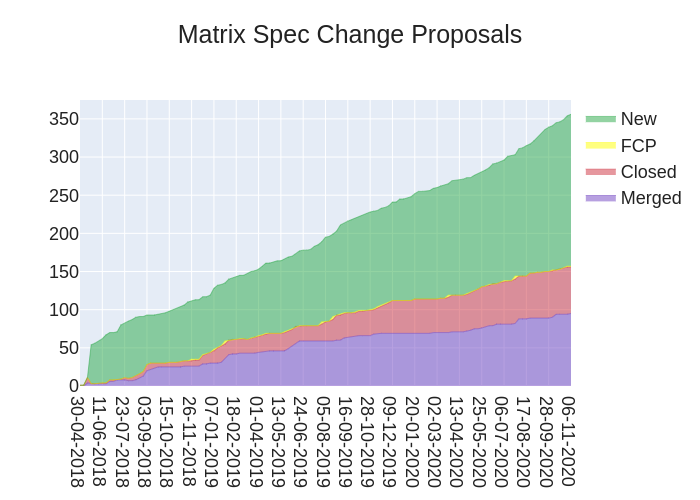
Dept of Servers 🏢
Synapse
callahad offered:
Happy November from the Synapse team! As mentioned last week, we pushed a small v1.22.1 release last Friday which fixed two regressions:
Fix a bug where an appservice may not be forwarded events for a room it was recently invited to. Broke in v1.22.0. (#8676)
Fix
Object of type frozendict is not JSON serializableexceptions when using third-party event rules. Broke in v1.22.0. (#8678)If you haven't upgraded your Synapse in a while, please do.
A major focus of Synapse is being able to meet the performance and reliability needs of massive homeservers like
matrix.org. If you're curious about how Synapse's architecture has evolved over the years to meet these scaling challenges, check our our blog post from Tuesday: How we fixed Synapse's scalability!Lastly, we anticipate releasing 1.23.0 in the next fortnight; keep your eyes peeled for release candidates and let us know if you have any feedback. For a preview of what's coming, check out GitHub for the new commits that have landed on the
developbranch since our last release.
PLUS Matthew said:
Synapse now horizontally scales across multiple python processes, as of 1.22: you can configure it so that events are no longer sent through the main proc, eliminating the single biggest bottleneck for large scale Synapse deployments. Read all about it at https://matrix.org/blog/2020/11/03/how-we-fixed-synapses-scalability
Dendrite / gomatrixserverlib
Dendrite is a next-generation homeserver written in Go
Neil Alexander told us:
Things have been quiet for Dendrite over the last week as I have been working on Pinecone/P2P and Kegan has been working on threading.
That said, a couple of minor changes have been merged:
Forgetting rooms is now supported (thanks S7evinK!)
The gjson dependency has been updated for correct integer safe ranges
Spec compliance is the same as last week:
Client-server APIs: 57%
Server-server APIs: 81%
As always, feel free to join us in #dendrite:matrix.org for general Dendrite chat or #dendrite-dev:matrix.org for development discussion.
Synapse Deployment 📥️
YunoHost
Pierre announced:
YunoHost is an operating system aiming for the simplest administration of a server, and therefore democratize self-hosting.
Synapse integration had been updated to 1.21.2 (1.22.1 available in branch
testing)Element Web integration had been updated to 1.7.9 (1.7.12 available in branch
testing)
Dept of Bridges 🌉
Gitter
Eric Eastwood told us:
Exciting visual progress this week with actual bridging between Gitter and Matrix utilizing the
virtualUserfeature,we've been iterating on the past couple weeks. Check out the image with all of the user avatars and display name goodness to make both chats on Element and Gitter feel one in the same!
You can also check out the live demo in Matrix Live!

Dept of Clients 📱
Hydrogen
Bruno reported:
As mentioned in the sync on Monday, I was mostly distracted from Hydrogen this week. (sorry Bruno -BP) I did release the picture lightbox on Monday, and yesterday managed to close 4 bugs. There's also a community PR for better usability and accessibilty in the login screen (keep those coming!) and after some work to make encryption more robust, I hope to do a release with all those goodies tonight.
Check out the demos vid for more Hydrogen!
Fractal
Alexandre Franke said:
Since a couple of weeks ago, we have merged a couple of branches that do a couple of things:
Clean up use of deprecated gtk-rs API
Minimize use of child properties, which are gone in GTK4
Remove use of widgets what are gone in GTK4, such as GtkAlignment
And here’s another nudge, calling for reviewers for that mega merge request for us to switch to
matrix-rust-sdk.
Element for Android 1.0.10
benoit said:
Element for Android 1.0.10 has been released to the beta channel of the PlayStore. We will push it to prod if there is no major problem with it. Full release notes: https://github.com/vector-im/element-android/releases/tag/v1.0.10.
#1921 being fixed! ❤️
Element-iOS
Manu offered:
This week, we came back to the background sync work to quickly display a notified message in the app. In parallel, we created a profiling tool at the SDK level to track performance like this one.
Element Web/Desktop
Neil enunciated:
We are working through some low hanging fruit around post registration, blank screen interaction prompts and toast tweaks. We are also experimenting with SSO for matrix.org. Meaning that Element will give the user the option of either username/password or SSO. Finally, we are continuing our VoIP efforts and nailing down the designs, checkout Matrix Live for all the details. Next week we'll carry on with post registration UX, VoIP improvements.
Dept of SDKs and Frameworks 🧰
Matrix SDK for Elixir
cognitive_tea reported:
Hi all! I think this is the right place to share this 🤞. I've been working on a Matrix SDK for Elixir over the last few months as a side project, it's very early days and it's currently just a bare-bones wrapper for the Client-Server API. I've also written the Elixir/Erlang bindings for Olm (currently missing group sessions) which should be added to the SDK soon. The repo can be found here: https://github.com/niklaslong/matrix-elixir-sdk and the Elixir bindings for Olm are linked in the readme.
It is the right place! Thanks cognitive_tea :D
Asked if there were big plans for use of the project
Not as yet, though a few people have reached out to me already and are building on top of it. I started it as a way to get going with Matrix dev and as a fun side project. That being said, I think providing the tools to Matrix-enable Elixir apps might lead to some interesting things. If anyone has any precise ideas on how they would want to integrate their Elixir apps with Matrix, I'd be super happy to have a chat 👍️ Less precise ideas are also welcome, of course 🙂
Dept of Bots 🤖
Hemppa
Cos announced:
Hemppa the bot is a generic bot for writing modules as easily as possible in Python. Thanks to issues with Freenode IRC bridge Hemppa got a new module for basic relaybot bridging of any Matrix rooms. Relaybots are stupid, but sometimes there's no working alternative. https://github.com/vranki/hemppa#relay-bridge
Dept of Events and Talks 🗣️
Arch Conf 2020
Brendan Abolivier reported:
I did a talk at Arch Conf 2020 last month, on a generic introduction of Matrix and how to install a Matrix homeserver on Arch Linux. The recording has just been uploaded; it can be found on CCC's media site as well as YouTube 🙂
YES BRENDAN!
Matrix in the News 📰
Oleg's talk, the article
emorrp1 told us:
New Matrix coverage in LWN via an Open Source Summit Europe talk https://lwn.net/SubscriberLink/835880/bd73956d4ceb6cf5/
See last week for the talk!
Final Thoughts 💭
TeeCee reported:
I stumbled upon this: https://www.reddit.com/r/linux/comments/jozg0v/how_i_got_my_group_chat_to_move_to_matrix/
I love that the comments, even on Reddit, are mostly positive. A really nice report.
Dept of Ping 🏓
Here we reveal, rank, and applaud the homeservers with the lowest ping, as measured by pingbot, a maubot that you can host on your own server. Join #ping:maunium.net to experience the fun live, and to find out how to add YOUR server to the game.
| Rank | Hostname | Median MS |
|---|---|---|
| 1 | envs.net | 556 |
| 2 | privacytools.io | 579.5 |
| 3 | maescool.be | 621 |
| 4 | casavant.org | 750 |
| 5 | apetre.sc | 750 |
| 6 | matrix.thedisco.zone | 1113 |
| 7 | matrix.org | 1159 |
| 8 | zemos.net | 1256.5 |
| 9 | matrix.sp-codes.de | 1263 |
| 10 | halogen.city | 2616 |
That's all I know 🏁
See you next week, and be sure to stop by #twim:matrix.org with your updates!
How we fixed Synapse's scalability!
Hi all,
We had a major break-through in Synapse 1.22 which we want to talk about in more detail: Synapse now scales horizontally across multiple python processes.
Horizontal scaling means that you can support more users and traffic by adding in more python processes (spread over more machines, if necessary) without there being a single bottleneck which all the traffic is passing through - as opposed to vertical scaling where you make things go faster overall by making the bottleneck go faster.
After many years of having to vertically scale Synapse (by trying to make the main process go faster) we’re now finally at the point where you can configure Synapse so that messages no longer flow through the main process - eliminating the bottleneck entirely. What’s more, the Matrix.org homeserver has now been successfully running in this config and enjoying the massive scalability improvements for the last 2 weeks! Huge kudos goes to Erik and the wider Synapse team for pulling this off.
Some readers might wonder how this ties in with Dendrite entering beta, given one of Dendrite’s design goals is full horizontal scalability. The answer is that we’re very much using Dendrite for experimentation and next-gen stuff at the moment (currently focused more on scaling downwards for P2P rather than scaling upwards for megaservers) - while Synapse is the stable and long-term supported option.
So, that’s the context - now over to Erik with more than you could possibly ever want to know about how we actually did it...
Background
Synapse started life off back in 2014 as a single monolithic python process, and for quite a while we made it scale by adding more and more in-memory caches to speed things up by avoiding hitting the database (at the expense of RAM). It looked like this:

Eventually the caches stopped helping and we needed more than one thread of execution in order to spread CPU across multiple cores. Python’s Global Interpreter Lock (GIL) means that Python can mainly only use one CPU core at a time, so starting more threads doesn’t help with scalability - you have to run multiple processes.
Now, the vast majority of the work that Synapse does is related to “streams”.
These are append only sequences of rows, such as the events stream, typing
stream, receipts stream, etc. When a new event arrives (for example) we write
it to the events stream, and then notify anything waiting that there has been
an update. The /sync endpoint, for instance, will wait for updates to streams
and send them down to long-polling Matrix clients.
Streams support being added to concurrently, so have a concept of the “persisted up-to position”. This is the point where all rows before that point have finished persisting. Readers only read up to the current “persisted up-to position”, so that they don’t skip updates that haven’t finished persisting at that point. (E.g. if two events A and B get assigned positions 5 and 6, but B finishes persisting first, then the persisted up to position will remain at 4 until A finishes persisting and then it jumps to 6).
To split any meaningful amount of work into separate processes, we need to add a mechanism where processes can be told that updates to streams have happened (otherwise they’d have to repeatedly poll the DB, which would be deeply inefficient). The architecture ended up being one where we had the “main” process that streams updates via a custom replication protocol (initially long-polling HTTP; later custom TCP) to any number of “worker” processes. This meant that we could move sync stream handling (and other read apis) off the main process and onto workers, but also that all database writes had to go through the single main process (as it was a star topology, the main process could talk to all workers but workers could only talk to the main process and not each other).
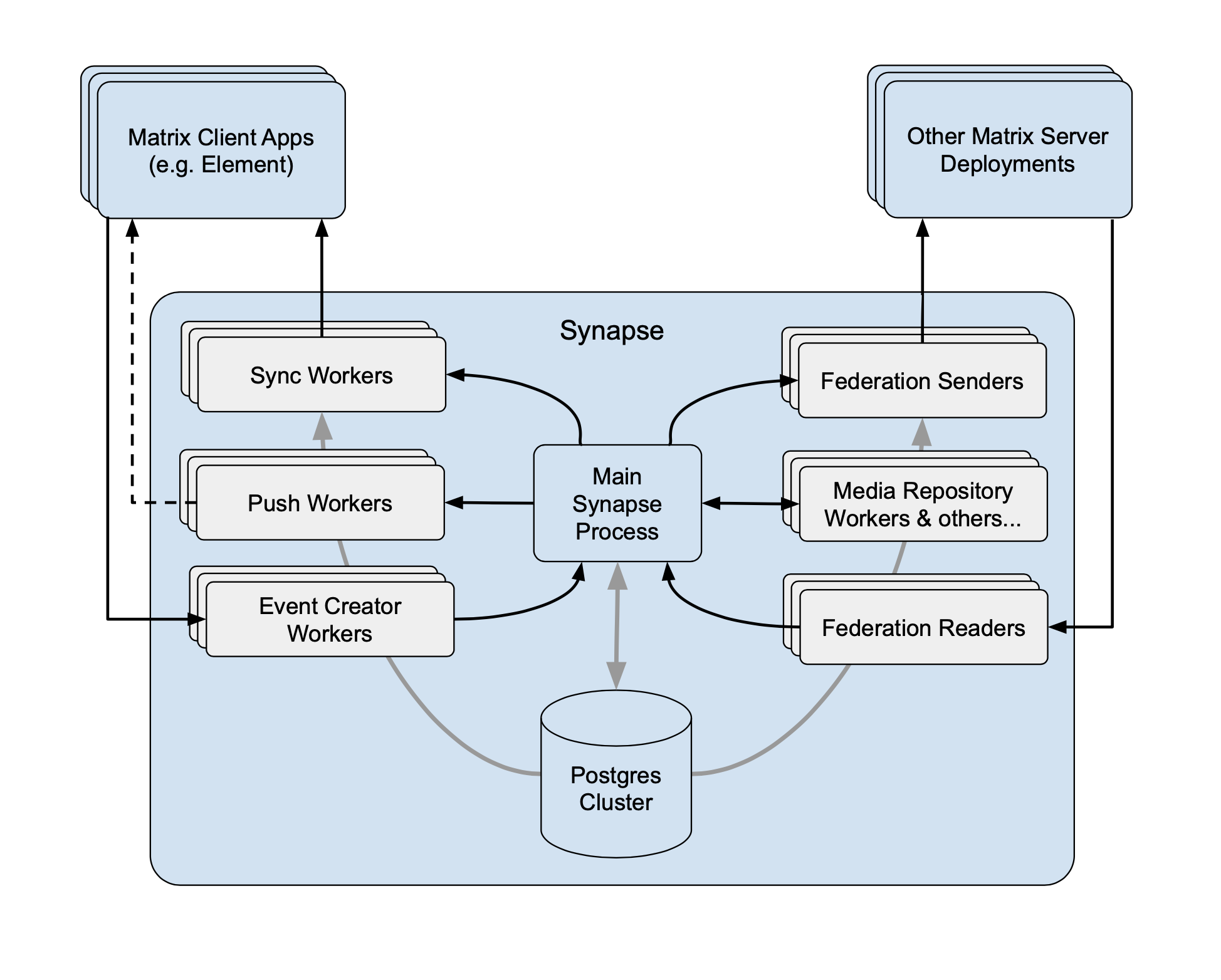
As an aside: cache invalidations also had to be streamed down the replication connections, which has the side effect that we could only cache things that would only be invalidated on the main process.
We continued to move more and more read APIs out onto separate workers. We also added workers in front of the main process that would e.g. handle the creation of the new events, authenticating, etc, and then call out to the main process with the event for it to persist the event.
Moving writes off the main process
Eventually we ran out of stuff to move out of the main process that didn’t involve writing to the DB. To write stuff from other processes we needed a way for the workers to stream updates to each other. The easiest and most obvious way was to just use Redis and its pub/sub support.
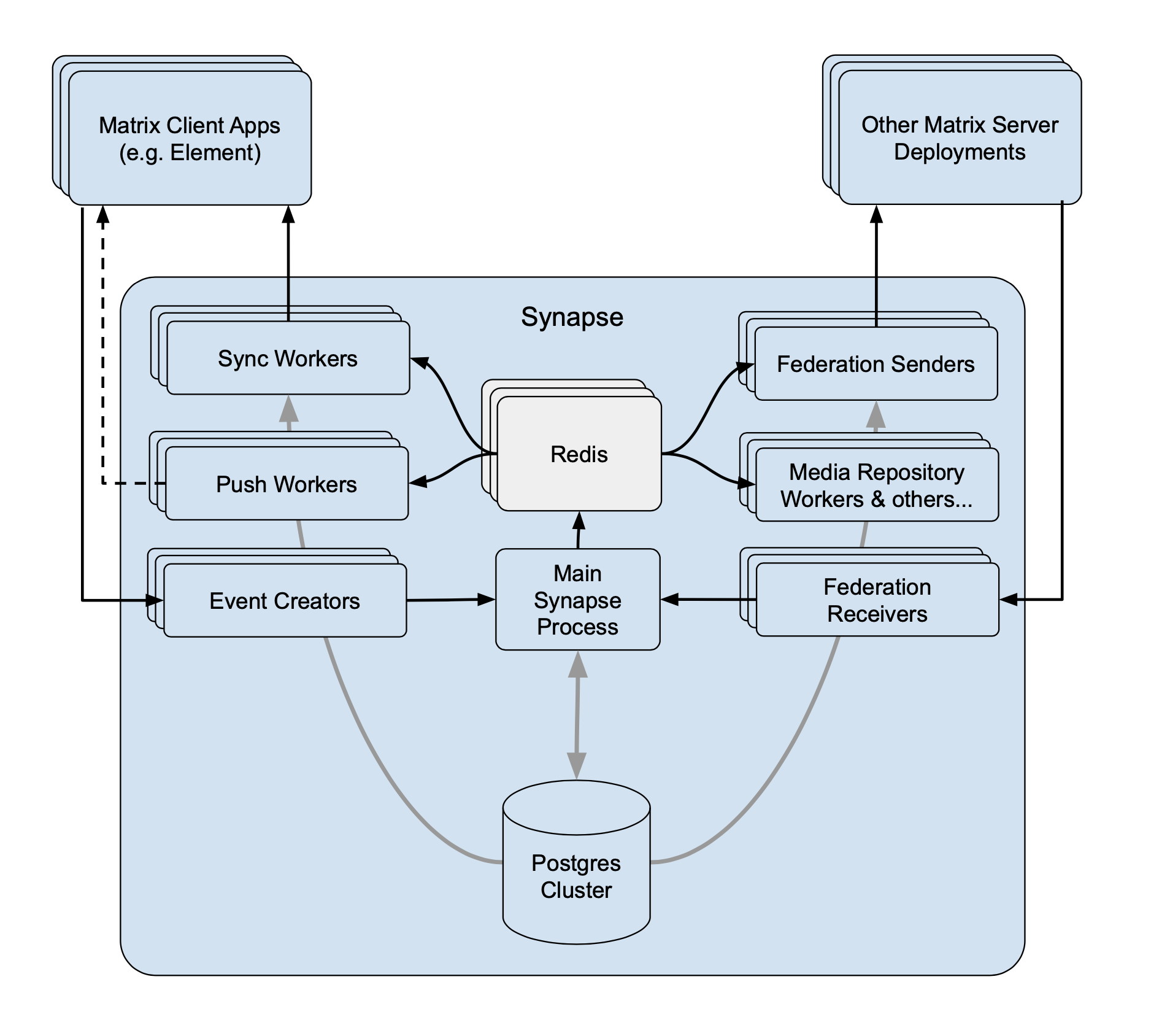
This almost allowed us to move writing of a particular stream to a different worker, except writing to streams generally also meant invalidating caches which in itself requires writing to a stream. We needed a way of writing to the cache invalidation stream from multiple workers at once.
Sharding the cache invalidation thankfully turned out to be easy, as workers would simply call the cache invalidation function whenever they get an invalidation notice over replication. In particular, the ordering of invalidations from different workers doesn’t matter and so there isn’t a need to calculate a single “persisted up-to position”. Sharding then just becomes a case of adding the name of the worker that is writing the update to the replication stream, and then workers reading from it can basically treat the cache stream the same as if they were multiple streams, one per worker.
This then unlocks the ability to move writing of streams off the main process and onto different workers - and so we added the “event persister” worker for offloading the main event stream off the main process:
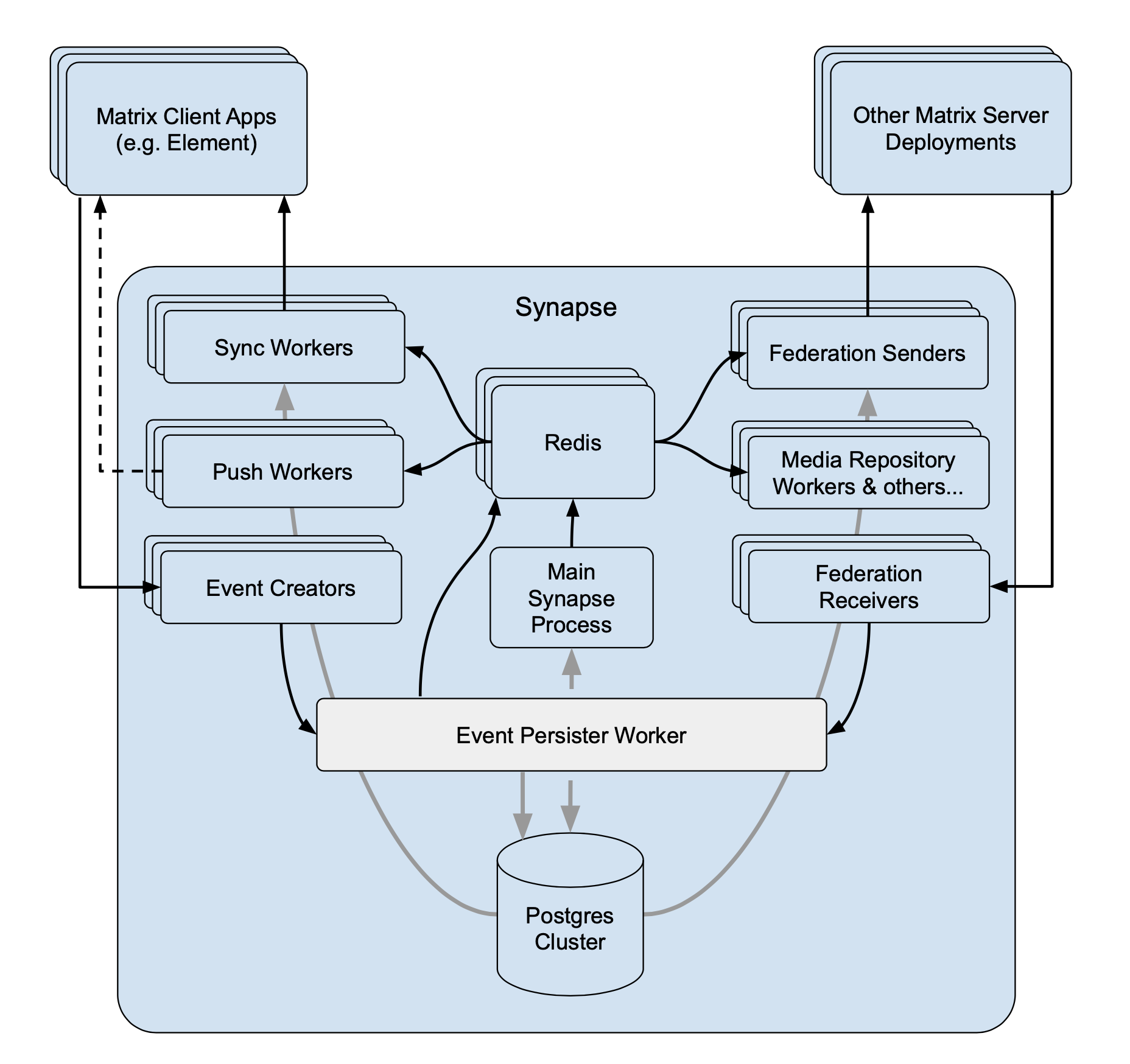
Sharding the events stream
Eventually the worker responsible for doing nothing but persisting events started maxing out CPU. This meant that we had to look at sharding the events stream, i.e. writing to it from multiple workers.
This is more complicated than sharding the cache invalidation stream as the ordering of the events does matter; we send them down sync streams, in order, with a token that indicates where the sync stream is up to in the events stream. This means that workers need to be able to calculate a “persisted up-to position” when getting updates from different workers.
The easiest way of doing that is to simply set the persisted up-to position as the minimum position received over federation from all active writers. This works, except events would only be processed after all other writers have subsequently written events (to advance the persisted position past the point at which the event was written), which can add a lot of latency depending on how often events are written.
A refinement is to note that if you have a persisted up-to position of 10, then receive updates at sequential positions 11, 12, 13 and 14, you know that everything between 10 and 14 has finished persisting (as you received updates about them), and so can set the persisted up-to position to 14. Annoyingly, it’s not required that positions are sequential without gaps (due to various technical considerations), and so in the worst case this still has the same problems as the naïve solution.
To avoid these problems we change the persisted up-to position to be a vector clock of positions; tracking a vector of positions - one per writer. This still allows answering the query of “get all events after token X” (as events are written with the position and the name of the writer). The persisted up-to position is then calculated by just tracking the last position seen to arrive over replication from each writer.
This allows writing events from multiple workers, while ensuring that other workers can correctly keep track of a “persisted up-to position”. Then it's just a matter of inspecting the code to ensure that it does not assume that it is the only writer to the stream. In the case of writing to the events stream, we note that the function persisting events assumes it's the only writer for a given room, so when sharding we have to ensure that there are no concurrent writes to the same room. This is most easily done by sharding based on room ID, and ensuring that the mapping of room ID to worker does not change (without coordination).
The only thing left is to then encode the vector clock position into the sync
tokens. We want to ensure that these tokens are not too long, as they get
included as query string parameters (e.g. the since= parameter of /sync).
By assigning persistent unique integer IDs to workers the vector clock can be
persisted as a sequence of pairs of integers, which is relatively few bytes so
long as we don’t have too many workers writing to the events stream. We can
further reduce the size of the tokens by calculating an integer “persisted
up-to position” as we did before, encoding that and only including positions
for workers that are larger than the integer persisted upto position. (The
idea here is that most of the time only a small number of workers will be
ahead of the calculated persisted up-to position, and so we only need to
encode those).
And this is what we have today:
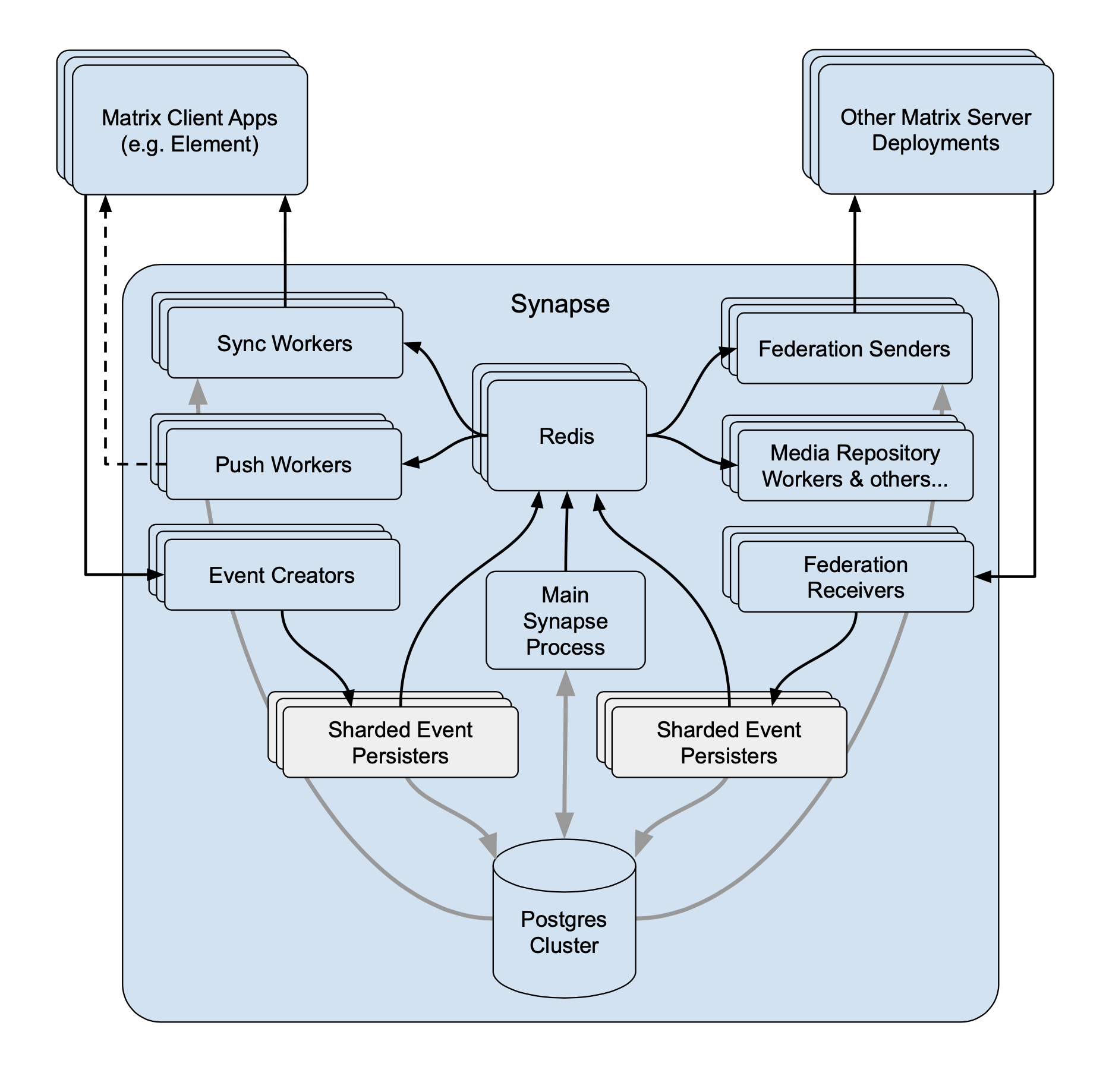
The major limitation of the current situation is that you can’t dynamically add/remove workers which persist events, as the sharding by room ID is calculated at startup, and so changing it requires restarting the whole system. This could be replaced by any system that allowed coordination over which persister is allowed to write to a room at any given point. However this is likely tricky to get right in practice, but would allow dynamic auto scaling of deployments, or automatically recovering from a worker that gets wedged/dies.
Finally, it’s worth noting that sharding event persisters isn’t the only performance work that’s been going on - switching everything over to python 3 and async twisted has helped, along with lots of smaller optimisations on the hot paths, and further rebalancing workers (e.g. moving background jobs off the master process to dedicated workers). We’ve also benefited a lot from the maintainability of rolling out mypy typing throughout the codebase. And next up, we’ll be going back to speeding up the codebase as a whole - starting with algorithmic state resolution improvements! 🎉
Performance
So, how does it stack up?
Here’s the send time heatmap on Matrix.org showing the step change on Oct 16th when we rolled out the second event persister (full disclosure: this also coincides with moving background processes off the main Synapse process to a background worker). As you can see, we go from messages being spread over a huge range of durations (up to several seconds) to the sweet spot being 50ms or less - a spectacular improvement!
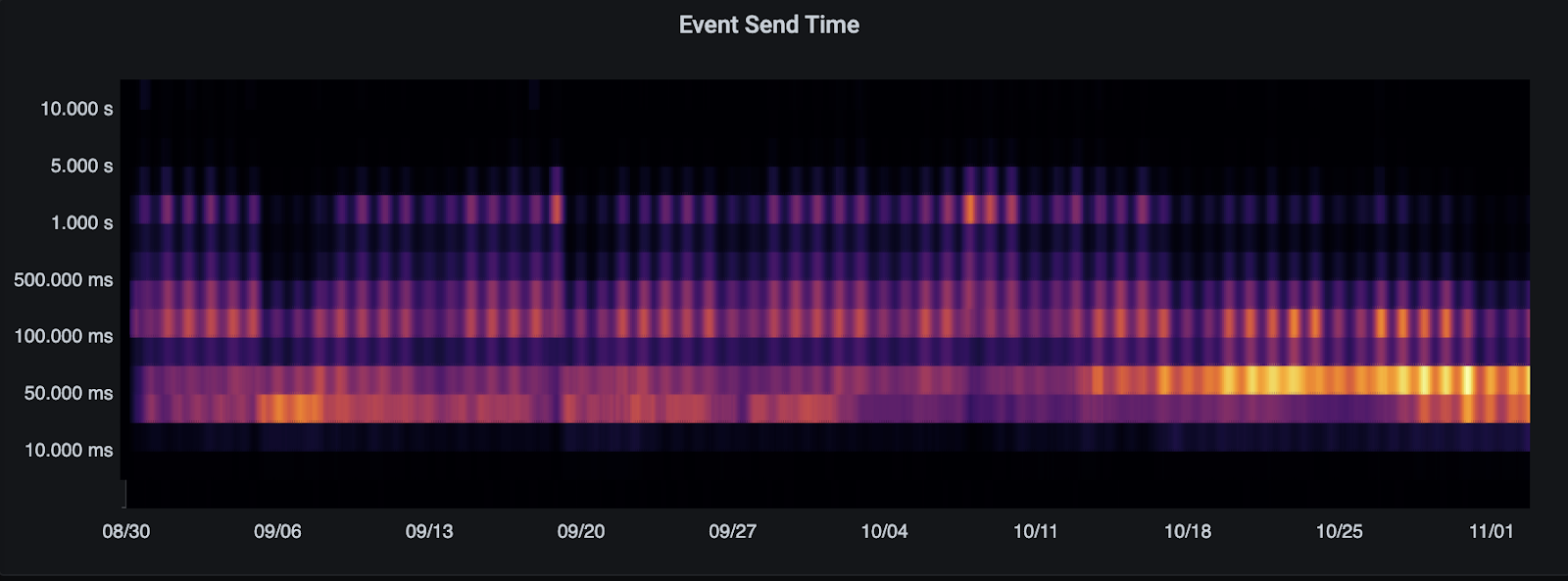
Meanwhile, here’s the actual CPU utilisation as we split the traffic from a single event persister (yellow) to two persisters (one yellow, one blue), showing the sharding beautifully horizontally balancing CPU between the two active/active worker processes:

We’ve yet to loadtest to see just how fast we can go now (before we start hitting bottlenecks on the postgres cluster), but it sure feels good to have all our CPU headroom back on Matrix.org again, ready for the next wave of users to arrive.
Conclusion
So there you have it: folks running massive homeservers (50K+ concurrent users) like Matrix.org (and cough various high profile public sector deployments) are no longer held hostage by the bottleneck of the main synapse process and should feel free to experiment with setting up event persister workers to handle high traffic loads. Otherwise, if you can spread your users over smaller servers, that’s also a good bet (assuming they don’t have massively overlapping room membership, like we see on Matrix.org.)
The current worker documentation is up-to-date, although does assume you are already very familiar with how to administer Synapse. It’s also very much subject to change, as we keep adding new workers and improving the architecture. However, now is a pretty good time to get involved if you’re interested in large-scale Matrix deployments.
-- The Synapse Team
This Week in Matrix 2020-10-30
Matrix Live 🎙
sometimes you'll come across us at FOSDEM and we'll say "oh it's the future", and we're trying to make this an actual thing
- Half-Shot on getting from sci-fi to reality
Dept of Spec 📜
Spec
anoa told us:
Here's your weekly spec update! The heart of Matrix is the specification - and this is modified by Matrix Spec Change (MSC) proposals. Learn more about how the process works at https://matrix.org/docs/spec/proposals.
MSC Status
Closed MSCs:
- [WIPish] MSC1777: peeking over federation (via server pseudousers)
- Obsoleted in favour of MSC2444
Merged MSCs:
MSCs in Final Comment Period:
- No MSCs are in FCP.
New MSCs:
Also heads up, the nomenclature for Communities v2 (groups-as-rooms) is now Matrix Spaces! Check out MSC1772 for the details!
Spec Core Team
In terms of Spec Core Team MSC focus for this week, we're continuing with the widget theme: MSC2774 (widget URL template param), MSC2765 (widget avatars), and MSC2790 (modal widgets).
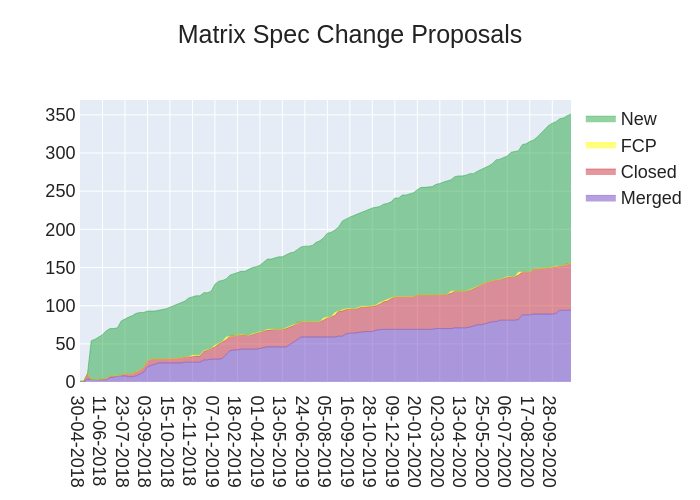
New spec platform
wbamberg told us:
Updates on the new spec platform: we can render HTTP APIs (https://adoring-einstein-5ea514.netlify.app/spec/client-server/#login) and events (https://adoring-einstein-5ea514.netlify.app/spec/client-server/#room-events).
Dept of Built on Matrix 🏗️
Chupacabra Social
patrick told us:
From the creators of Noteworthy, introducing Chupacabra, a Matrix powered content sharing and discussion layer.
Video demo: https://youtu.be/hAouGTL7XAQ
Github: https://github.com/decentralabs/chupacabra
Join us in #chupacabra:chupa.social to learn more.
Dept of Servers 🏢
Conduit
Conduit is a Matrix homeserver written in Rust https://conduit.rs
Timo announced:
Hello everyone, I have some amazing news to share with you! While Conduit is getting better at federating, Famedly (https://famedly.com) has agreed to support me working on Conduit financially. With this news come some organizational changes:
Conduit development now happens at https://gitlab.com/famedly/conduit, please submit new issues and pull requests over there. I will update all links in the coming days.
Note: Famedly does not own the project and Conduit will stay free and open source forever!
matrix-media-repo
matrix-media-repo is a highly customizable multi-domain media repository for Matrix
TravisR announced:
v1.2.1 of matrix-media-repo, a third-party media repo for large homeservers, is out now. It's primarily a maintenance update though also has support for audio files if for some reason you need that.

Synapse
callahad said:
Synapse 1.22.0 is out! We announced its first release candidate last week, and after a small rc2 the final release was published last Tuesday. We anticipate a small 1.22.1 release later today with fixes for messages not always being sent to app services (#8673) and serialization errors with third-party event rules (#8678).
We continue to see improved client join Apdex scores for matrix.org, indicating that our work in 1.22.0 to split background tasks into separate workers and allow for sharded event persisters successfully improved the user-visible performance of large homeservers.
In other news, we pushed a temporary hotfix to the matrix.org homeserver earlier this week, instructing it to drop all cross-user
m.key_share_requestmessages. This was necessary to mitigate a bug in a third-party library which caused some clients to flood the server with requests. We'll re-enable these messages once we resolve issue #8677. In the meantime, we strongly encourage FluffyChat users to upgrade to version 0.21.1.We're hard at work on the next release of Synapse, and the development branch already includes many bugfixes, several new admin APIs, and support for structured logging—stay tuned!
Dendrite
Dendrite is a next-generation homeserver written in Go
kegan said:
There is no release this week, be sure to have v0.2.1 installed for a more stable experience! A few documentation changes have been made this week:
Docker sample configs are now correct.
The
MaxMessageBytesfor Kafka messages is now configurable - thanks @S7evinK!A reverse-proxy sample now exists for Hiawatha - thanks @ErgoPoe!
Spec compliance remains unchanged:
Client-server APIs: 57%
Server-server APIs: 81%
Things have been quiet this week because Neil has been working on new P2P routing schemes and I have been working
on a Threading proposal which will be tried out in Dendrite in the coming days.
Synapse Deployment 📥️
Kubernetes
Ananace announced:
Just pushed the Synapse 1.22.0 versions for my K8s-optimized image and Helm chart.
... 🕛 time 🕗 went 🕟 by 🕥 ...
Updated my Synapse chart and K8s-optimized image to 1.22.1 as well, and got the element-web chart updated to 1.7.12
YunoHost
Pierre reported:
YunoHost is an operating system aiming for the simplest administration of a server, and therefore democratize self-hosting.
Synapse integration had been updated to 1.20.1 (1.21.2 available in branch
testing)Element Web integration had been updated to 1.7.9 (1.7.10 available in branch
testing)
Dept of Bridges 🌉
🌈🌉 Bifrost reaches 0.2.0
Half-Shot reported:
Hey folks, today I bring you a gift wrapped rainbow coated present, which could only mean Bifrost 0.2.0 is out!.
We've been making major progress trying to align bifrost with the many XMPP clients out there like Gajim and Swift, by improving it's compatibility with the various XEPs. I've also noticed a few users have started using it to bridge their Matrix and XMPP communities together which is super cool :)
Please read the latest changelogs over at https://github.com/matrix-org/matrix-bifrost/releases/tag/0.2.0 and upgrade away!
Gitter
Eric reported:
The merge request for the native Gitter bridge has just got underway and we're making progress towards sharing all Gitter messages in public rooms across to Matrix.
We'll continue to iterate on the Gitter
virtualUsersupport as we go along.
mautrix-telegram
Tulir said:
v0.9.0-rc1 was released last weekend. Changes since v0.8.x include:
Prometheus metric names are now prefixed with
bridge_Support for Telegram QR code login
Support for double puppeting for users on other servers
Options for automatic backfilling of missed messages and old messages when creating portals
Switched end-to-bridge encryption to use mautrix-python instead of the previous hacky matrix-nio solution
This week I fixed some bugs, so I'll probably make a rc2 in the near future.
Dept of Clients 📱
Fluffychat 0.21.1 is released!
FluffyChat is a cute cross-platform matrix client. It is available for Andorid, iOS, Web and Desktop.
sorunome announced:
It is already in fdroid, google play and ios should follow shortly. We highly encourage people to update, as it contains an important bugfix of sending out way too many key requests, which can cause bad server performance
Features
New user viewer
Add code syntax highlighting in messages
Updated translations: Thanks to all helpers
Changes
- Stories feature removed
Fixes
Fixes sentry
Fixes Android download
Minor fixes


quotient
kitsune reported:
Hot on the heels of 0.0.9.5 beta, Quaternion 0.0.9.5 beta2 is released, fixing a couple of blunders, notably inability to build with external libQuotient. Keep testing, keep translating!
Hydrogen
Bruno announced:
Hydrogen can now show images in encrypted rooms! I hope to also release a lightbox feature this afternoon to show a zoomed version of an image.
Element-iOS
Manu announced:
This week, we have almost finished the authentication for widgets and jisti in particular. The project is now fully compatible with Xcode 12.
Element Android
benoit offered:
We are making progress on the performance side. Now sending an event is much faster than before. We also are optimizing the crypto code. All those improvements will be available in the next release (v1.0.10), maybe next week?
Besides that, we are implementing the remaining features, we are trying to have the same level of functionality (= parity) than Element Web. We know that we have a great number of bugs to fix on the existing feature, we are also trying to fight them.
As a reminder, the new Android Matrix SDK is available at https://github.com/matrix-org/matrix-android-sdk2 and a nice sample application has been developed and is available at https://github.com/matrix-org/matrix-android-sdk2-sample.
You had me at "progress on the performance side"! I am looking forward to the new Element Android :D
Element Web
Neil reported:
This week we shipped Element 1.7.12 which contains some high priority fixes, specifically:
- Fixes secret storage / cross-signing reset to avoid asking for the previous key you no longer have
- Fixes widget pinning and Jitsi calls when custom themes are used
Aside from that we continue to work on the voice and video calling experience as well as improving the initial onboarding experience of the app.
Nheko
Nheko is a desktop client using Qt, Boost.Asio and C++17. It supports E2EE (with the notable exception being device verification for now) and intends to be full featured and nice to look at
Nico (@deepbluev7:neko.dev) offered:
This was an exciting week again. Trilene did the usual and just opened a PR, that implements the video part of call support. In my testing so far this seems to work amazingly well (ignore, that my webcam is crappy in the video, I only have so many devices...)! It's hard to overstate my satisfaction, if I am allowed to quote songs without getting a DMCA! If you want to try it out, you will need the qmlgl plugin at runtime (I had to patch some ebuilds on Gentoo to do so) and build Nheko from source. Support in our AppImage and Flatpak and for our Windows and MacOS builds will come at a later date. A big shoutout to trilene, who just works on VOIP in Nheko, without saying a word, and then drops a ready PR.
Another exciting new feature by lorendb, you can now specify
--profile <profilename>, when you start Nheko, to create a separate profile. This allows you to open multiple instances and use multiple accounts at the same time (but it still uses separate instances of Nheko). This is pretty useful, if you have multiple accounts on different homeservers or are testing stuff for example. He also added a shortcut to delete the current content of the message area (Ctrl-U).We also fixed a long standing bug, that crashed Nheko when pasting an image on mac OS, prevented copying text in some cases and build times should be about halfed again.
That's all I got today. I guess we should do a new release at some point?
I asked about trilene, who is a reliable Nheko contributor, Nico replied:
trilene seems to be a bit camera shy and prefer to work on code than take credit and talk about upcoming features. I'm surprised everytime, when a new PR is opened or trilene asks a weird question, that can only end up in an amazing contribution :3
\o/
Dept of SDKs and Frameworks 🧰
matrix-bot-sdk 0.5.8 out now
TravisR told us:
matrix-bot-sdk v0.5.8 is out now with experimental support for EDUs being sent to appservices (per MSC2409).
To enable it you'll need Synapse 1.22.0 (released this week) and v0.5.8 of the bot-sdk. Then, add
"de.sorunome.msc2409.ephemeral": trueto your appservice registration file (at the root level) and turn on thede.sorunome.msc2409.ephemeralflag in yourIAppserviceRegistrationsupplied to the bot-sdk. If all goes according to plan, you'll be able to useappservice.on("ephemeral.event", (ev) => {})to start processing EDUs.
Dept of Ops 🛠
Icinga End-to-End Check
Nik said:
I hacked together a maubot-based roundtrip test that leverages the echo bot's ping command reply and reports rtt to Icinga as a passive check result. Its practical use is scientifically questionnable, but it gives a hint on end-user experience. Find it here: https://edugit.org/nik/maubot-pingcheck
Dept of Services 🚀
Enabling encryption for bots on t2bot.io
TravisR offered:
Starting November 28th and 29th of this year, many bots on t2bot.io will be supporting end-to-end encryption. Though not all bots will be supporting it, this is an important milestone towards getting end-to-bridge encryption enabled on t2bot.io as a proof of being able to scale to the higher demand of encrypted rooms.
The eventual goal is to support encryption on all of t2bot.io’s bots and bridges, however we need to take small steps to get there 🙂. Note that in order to function, bots will decrypt all messages they see, but only respond to the ones they care about - this can still be uncomfortable for some rooms though, so feel free to kick them out.
For more detail on which bots are getting support and what all this entails/means, please see the dedicated blog post.
We teased this a little on Matrix Live last week (I think?), but so awesome to see this publicly announced.
Keymaker (Serverlist Project)
MTRNord reported:
Keymaker is a new WIP Project of some people (over at #serverlist:nordgedanken.dev ) that aim to provide a mastodon alike Server List and we would love to get some more input from the Community for this project on whats wanted, whats needed and whats maybe not that good to base on the mastodon counterpart.
This means we are building:
A list of Servers where Owners can add their servers
We try to do Quality controls (No fully self add. Servers get reviewed.) using a Code of Conduct Ruleset
Verified Listings using well-known files on serverside (Also allowing Admins to modify server data themself)
Server Details like:
Ping and Avalibility Stats (thanks to tulir for providing a API)
Public Room Lists fetched from the Server
NSFW Ratings (A NSFW tag was too generic for us)
A Section to list Rules
Admin adresses for easy ways of reaching the Server admins
Allowing to select registration state ("Open", "Invite Only", "Closed")
The Code is fully written in Rust and using Postgres as a backend. Have a look at: https://github.com/daydream-mx/keymaker
Join us at: #serverlist:nordgedanken.dev
In a further post we plan to announce the launch of this Project as a Website. Server owners might get a ping before that to allow for setting up servers for this. This Project is not yet deployed to be used.
This is really cool. I suggested it might start to kickstart people hosting their own small, publicly open servers.
MTRNord replied:
As we also allow non public servers (registration -> closed) it may also be a nice way to find communities that federate and have a look if they have a intresting room to join in the public rooms list. :)
Dept of Bots 🤖
Bubo
kapina-jaywink reported:
Bubo, the community helping bot-in-progress, gets releases and a new command:
breakout. The command can be used to create a breakout room from the current room. Bubo will create the room, invite and make the requester an admin, and confirm in the original room. Anyone who reacts with an emoji to the confirmation will get an invite to the breakout room. Currently breakout rooms are non-public and non-encrypted by default.Find Bubo v0.2.0 here.
Dept of Events and Talks 🗣️
Neil on being an eng manager
Neil announced:
Hey all, I do engineering managery stuff at Element, if you ever wondered what on earth that actually means, here is a video of me going on and on about it. https://www.youtube.com/watch?v=2NflccKdGqU
Sell it Neil! This is an insightful chat - if you're interested in the dilemas and thoughts of an eng manager, be sure to check this out!
Dept of Ping 🏓
Here we reveal, rank, and applaud the homeservers with the lowest ping, as measured by pingbot, a maubot that you can host on your own server. Join #ping:maunium.net to experience the fun live, and to find out how to add YOUR server to the game.
| Rank | Hostname | Median MS |
|---|---|---|
| 1 | maescool.be | 653 |
| 2 | aragon.space | 707 |
| 3 | envs.net | 800 |
| 4 | matrix.vgorcum.com | 828 |
| 5 | elcyb.org | 1044 |
| 6 | neko.dev | 1104 |
| 7 | fab.network | 1112 |
| 8 | mailstation.de | 1128 |
| 9 | aragon.sh | 1364 |
| 10 | dodsorf.as | 1605 |
That's all I know 🏁
See you next week, and be sure to stop by #twim:matrix.org with your updates!
Synapse 1.22.0 released
Synapse 1.22.0 now available!
This release focused on improving Synapse's horizontal scalability, including:
- Support for running background tasks in separate worker processes.
- Fixes to sharded event persisters, which were experimentally introduced in 1.21.0.
- Fixing a message duplication bug with worker-based deployments. (#8476)
Synapse 1.22.0 also has a few other notable changes:
- Defaulting to version 6 rooms, per MSC2788.
- Initial support for three new experimental MSCs:
- Multi-arch Docker images, covering
arm64andarm/v7in addition toamd64.
Installation instructions are available on GitHub, as is the v1.22.0 release tag.
Lastly, Synapse is a Free and Open Source Software project, and we'd like to extend our thanks to everyone who contributed to this release, including @Akkowicz, @BBBSnowball, @maquis196, and @samuel-p.
The full changelog for 1.22.0 is as follows:
Synapse 1.22.0 (2020-10-27)
No significant changes.
Synapse 1.22.0rc2 (2020-10-26)
Bugfixes
- Fix bugs where ephemeral events were not sent to appservices. Broke in v1.22.0rc1. (#8648, #8656)
- Fix
user_daily_visitstable to not have duplicate rows per user/device due to multiple user agents. Broke in v1.22.0rc1. (#8654)
Synapse 1.22.0rc1 (2020-10-22)
Features
- Add a configuration option for always using the "userinfo endpoint" for OpenID Connect. This fixes support for some identity providers, e.g. GitLab. Contributed by Benjamin Koch. (#7658)
- Add ability for
ThirdPartyEventRulesmodules to query and manipulate whether a room is in the public rooms directory. (#8292, #8467) - Add support for olm fallback keys (MSC2732). (#8312, #8501)
- Add support for running background tasks in a separate worker process. (#8369, #8458, #8489, #8513, #8544, #8599)
- Add support for device dehydration (MSC2697). (#8380)
- Add support for MSC2409, which allows sending typing, read receipts, and presence events to appservices. (#8437, #8590)
- Change default room version to "6", per MSC2788. (#8461)
- Add the ability to send non-membership events into a room via the
ModuleApi. (#8479) - Increase default upload size limit from 10M to 50M. Contributed by @Akkowicz. (#8502)
- Add support for modifying event content in
ThirdPartyRulesmodules. (#8535, #8564)
Bugfixes
- Fix a longstanding bug where invalid ignored users in account data could break clients. (#8454)
- Fix a bug where backfilling a room with an event that was missing the
redactsfield would break. (#8457) - Don't attempt to respond to some requests if the client has already disconnected. (#8465)
- Fix message duplication if something goes wrong after persisting the event. (#8476)
- Fix incremental sync returning an incorrect
prev_batchtoken in timeline section, which when used to paginate returned events that were included in the incremental sync. Broken since v0.16.0. (#8486) - Expose the
uk.half-shot.msc2778.login.application_serviceto clients from the login API. This feature was added in v1.21.0, but was not exposed as a potential login flow. (#8504) - Fix error code for
/profile/{userId}/displaynameto beM_BAD_JSON. (#8517) - Fix a bug introduced in v1.7.0 that could cause Synapse to insert values from non-state
m.room.retentionevents into theroom_retentiondatabase table. (#8527) - Fix not sending events over federation when using sharded event writers. (#8536)
- Fix a long standing bug where email notifications for encrypted messages were blank. (#8545)
- Fix increase in the number of
There was no active span...errors logged when using OpenTracing. (#8567) - Fix a bug that prevented errors encountered during execution of the
synapse_port_dbfrom being correctly printed. (#8585) - Fix appservice transactions to only include a maximum of 100 persistent and 100 ephemeral events. (#8606)
Updates to the Docker image
- Added multi-arch support (arm64,arm/v7) for the docker images. Contributed by @maquis196. (#7921)
- Add support for passing commandline args to the synapse process. Contributed by @samuel-p. (#8390)
Improved Documentation
- Update the directions for using the manhole with coroutines. (#8462)
- Improve readme by adding new shield.io badges. (#8493)
- Added note about docker in manhole.md regarding which ip address to bind to. Contributed by @Maquis196. (#8526)
- Document the new behaviour of the
allowed_lifetime_minandallowed_lifetime_maxsettings in the room retention configuration. (#8529)
Deprecations and Removals
- Drop unused
device_max_stream_idtable. (#8589)
Internal Changes
- Check for unreachable code with mypy. (#8432)
- Add unit test for event persister sharding. (#8433)
- Allow events to be sent to clients sooner when using sharded event persisters. (#8439, #8488, #8496, #8499)
- Configure
public_baseurlwhen using demo scripts. (#8443) - Add SQL logging on queries that happen during startup. (#8448)
- Speed up unit tests when using PostgreSQL. (#8450)
- Remove redundant database loads of stream_ordering for events we already have. (#8452)
- Reduce inconsistencies between codepaths for membership and non-membership events. (#8463)
- Combine
SpamCheckerApiwith the more genericModuleApi. (#8464) - Additional testing for
ThirdPartyEventRules. (#8468) - Add
-doption to./scripts-dev/lint.shto lint files that have changed since the last git commit. (#8472) - Unblacklist some sytests. (#8474)
- Include the log level in the phone home stats. (#8477)
- Remove outdated sphinx documentation, scripts and configuration. (#8480)
- Clarify error message when plugin config parsers raise an error. (#8492)
- Remove the deprecated
Handlersobject. (#8494) - Fix a threadsafety bug in unit tests. (#8497)
- Add user agent to user_daily_visits table. (#8503)
- Add type hints to various parts of the code base. (#8407, #8505, #8507, #8547, #8562, #8609)
- Remove unused code from the test framework. (#8514)
- Apply some internal fixes to the
HomeServerclass to make its code more idiomatic and statically-verifiable. (#8515) - Factor out common code between
RoomMemberHandler._locally_reject_inviteandEventCreationHandler.create_event. (#8537) - Improve database performance by executing more queries without starting transactions. (#8542)
- Rename
CachetoDeferredCache, to better reflect its purpose. (#8548) - Move metric registration code down into
LruCache. (#8561, #8591) - Replace
DeferredCachewith the lighter-weightLruCachewhere possible. (#8563) - Add virtualenv-generated folders to
.gitignore. (#8566) - Add
get_immediatemethod toDeferredCache. (#8568) - Fix mypy not properly checking across the codebase, additionally, fix a typing assertion error in
handlers/auth.py. (#8569) - Fix
synmarkbenchmark runner. (#8571) - Modify
DeferredCache.get()to returnDeferreds instead ofObservableDeferreds. (#8572) - Adjust a protocol-type definition to fit
sqlite3assertions. (#8577) - Support macOS on the
synmarkbenchmark runner. (#8578) - Update
mypystatic type checker to 0.790. (#8583, #8600) - Re-organize the structured logging code to separate the TCP transport handling from the JSON formatting. (#8587)
- Remove extraneous unittest logging decorators from unit tests. (#8592)
- Minor optimisations in caching code. (#8593, #8594)
This Week in Matrix 2020-10-23
Matrix Live 🎙
Dept of Spec 📜
TravisR offered:
Hello everyone, normally anoa would be doing this update but today you get me (TravisR) instead. Luckily anoa has left me a script to run, so here's hoping I haven't completely messed up this week's update 😅
Here's your weekly spec update! The heart of Matrix is the specification - and this is modified by Matrix Spec Change (MSC) proposals. Learn more about how the process works at https://matrix.org/docs/spec/proposals.
MSC Status
Merged MSCs:
- Nothing to report 😢
MSCs in Final Comment Period:
New MSCs:
Closed MSCs:
Spec Core Team
In terms of Spec Core Team MSC focus for this week, we're still focusing on the same MSCs from previous weeks to get widgets over the line. This includes MSC2774 to have widgets aware of their widget ID, MSC2765 so widgets can be pretty in clients like Element, and MSC2790 to support a form of user input with widgets.
Normally there would be a graph here of our MSC progress, however my machine refuses to accept that line graphs are a real thing today. As a replacement, here's a snowfall accumulation graph for Banff as reported by Environment Canada.
Dept of Servers 🏢
mauliasproxy
Tulir told us:
I made a simple room alias proxy: https://mau.dev/tulir/mauliasproxy. It can be used to create room aliases on custom domains without having to host an actual Matrix homeserver there. The proxy basically just responds to federation room alias queries using data from another homeserver (that data is fetched with the C-S API).
Synapse
callahad reported:
A new release candidate appears! Synapse 1.22.0rc1 was published yesterday and includes support for running background tasks in separate worker processes, as well as fixes to sharded event persisters which were first introduced in 1.21.0.
These changes significantly improved our client join Apdex score for matrix.org by making join performance both faster and less variable.

Synapse 1.22.0rc1 also includes support for a few experimental MSCs:
MSC2732: Supporting olm fallback keys
MSC2697: Supporting device dehydration
MSC2409: Allowing appservices to receive ephemeral events like read receipts, presence, and typing indicators.
Lastly, the default room version is now version 6, per MSC2788.
In the coming weeks we'll focusing on improving Synapse's resilience in smaller to medium-sized deployments, primarily through improvements to state resolution. Stay tuned!
Thanks Dan!
Today's update comes courtesy of Dan Callahan (@callahad:matrix.org), who joined Element on Monday as an engineering manager supporting the Synapse team. Dan previously worked in Developer Relations at Mozilla, and he's excited to help Matrix realize its ambitious vision for private, secure, and standards-based communication for all.
Dendrite / gomatrixserverlib
Dendrite is a next-generation homeserver written in Go
Neil Alexander offered:
This week we released v0.2.0 on Tuesday, a reasonably big update containing various improvements over the initial beta release, and then followed it up with a bug-fix v0.2.1 release on Thursday.
Thanks to everyone who has been running Dendrite and reporting their findings, and also to contributors who have been submitting pull requests!
Changes this week include:
Dendrite no longer builds separate binaries for each polylith component, but instead has one multi-personality binary
Our Docker images have been simplified into two images: dendrite-monolith and dendrite-polylith
Internal HTTP API calls are now made using H2C (HTTP/2) in polylith mode, which resolves some head-of-line issues with the connection pool
Forward extremities have been refactored, which should fix some cases where room state can end up corrupted
A couple of bugs when handling state rewrites have been fixed
The sync API no longer sends old state events to clients as if they were new
SQLite locking bugs around the latest events updater have been resolved
Notification levels are now parsed correctly in power level events (thanks to Pestdoktor)
Invalid UTF-8 is now correctly rejected when making federation requests (thanks to Pestdoktor)
Spec compliance for v0.2.1:
Client-server APIs: 57%, up from 56% last week
Server-server APIs: 81%, up from 80% last week
As always, please feel free to join us in #dendrite:matrix.org for general Dendrite chat, and #dendrite-dev:matrix.org if you are interested in contributing!
Conduit
Timo stepped in to tell us:
This was another productive week:
- Improved thumbnailing algorithm (higher quality, less stored data, correct)
- Allow unjoined users to read state of world readable rooms (this makes shields.io work with conduit)
- Docs for cross compiling conduit
- Fixed stuck / double-join over federation
- Fixed random timeline reload bug
- Welcome message in admin room
- More frequent flushing
Some WIP things:
- Provide Conduit binaries for most platforms to make setting up or updating a Conduit instance even easier
- More reliable sending over federation
- Bring all features of our Ruma fork upstream
Thanks to everyone who supports me on Liberapay or Bitcoin!
Homeserver Deployment 📥️
Dendrite docker images
Dendrite is a next-generation homeserver written in Go
TR_SLimey offered:
I built some unofficial Dendrite docker images for Linux/ARM64, for those trying to run Dendrite on a Raspberry Pi, RockPro64 or others. They can be found here: https://hub.docker.com/r/trslimey/dendrite-monolith & https://hub.docker.com/r/trslimey/dendrite-polylith.
balaa reported:
Cool, we run Synapse on Pi0, Pi2 and Pi4 -- works reasonably well on each of them, i'm excited to try Dendrite
Synapse running on a Pi zero..?
Dept of Bridges 🌉
Gitter
Eric Eastwood announced:
The initial iteration of
virtualUsersis in shape to merge(check out the flair 🔥) and will probably deploy in a release next week. We've split the rest of thevirtualUserwork into follow-up issues we can iterate on. We're working on adding room ban and spam detection support forvirtualUsersto stop any bad actors. Then want to start on the actual Application Service bridge (Gitter <-> Matrix).
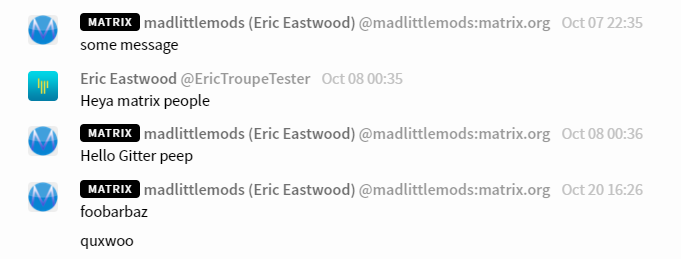
If you're curious about more of the details, you can track the greater GitLab epic.
🌈🌉 Bifrost* 0.2.0 is (nearly) out
Half-Shot offered:
I couldn't really wait to talk about before we actually hit 0.2.0 so here is a sneak peek at what's happening. We've spent a ton of time working on ironing out the bugs and making the bridge more XMPP complaint. The major headlines are:
Support Matrix -> XMPP edits
Set XMPP user displayname in the room based on their nickname (thanks uhoreg for mucking in there)
Improve performance of Matrix -> XMPP gateway messages and joining
Improve support for multiple devices for XMPP users connected to the gateway
maaaany bugfixes
You can read about (and run!) the latest release over at https://github.com/matrix-org/matrix-bifrost/releases/tag/0.2.0-rc1.
Incidentally, if you've not yet, then try joining some rooms such as
#twim#[email protected]from XMPP and see it live!*rainbum, as Mathijs prefers
Dept of Clients 📱
Hydrogen
Bruno said:
Hydrogen gained a settings panel this week with a better session backup UX and your end-to-end device information, which should make the manual verification easier. Messages with multiple lines are also rendered as such now, which makes a big difference in usability. The app also works offline again after session backup broke that. Apart from that, several smaller fixes also landed.
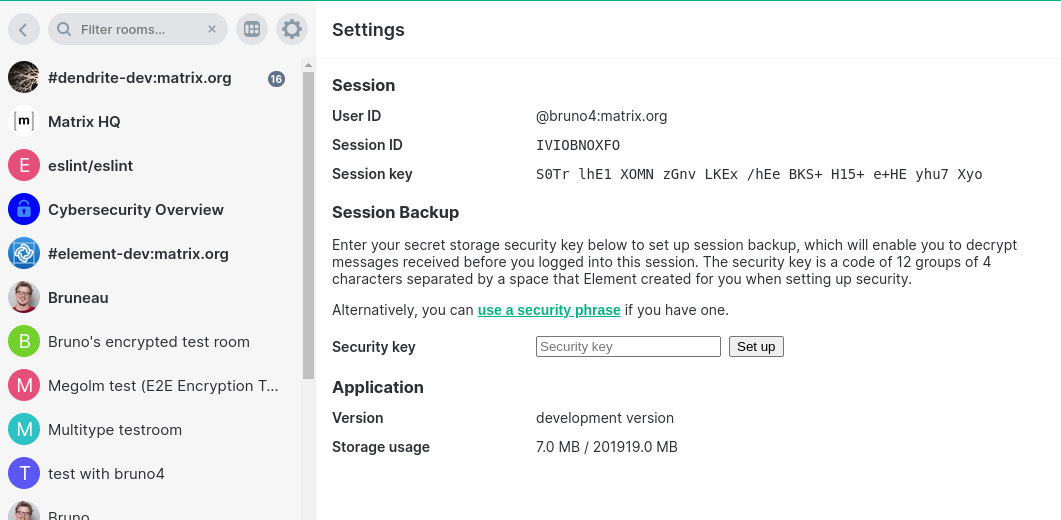
Also, image decryption is well on it's way with a prototype working. 🎉
Fractal
Alexandre Franke reported:
The massive MR to switch to matrix-rust-sdk is still being reviewed and help is still welcome. We have been working on other stuff as well. Actually, since our last news piece for the release of 4.4, quite a lot happened (around 60 commits) that we haven’t reported here yet:
Users can now go to the room settings to toggle notifications for each room individually.
Rounded corners around everything to match the latest upstream design tweaks (in Adwaita, the official GNOME theme).
Many maintainance changes: several dependencies have been updated, cleanups in various places, tightened flatpak permissions for better sandboxing…
And that’s not all! Good progress has been made towards rendering
formatted_body. Hopefully that should be merged soon.
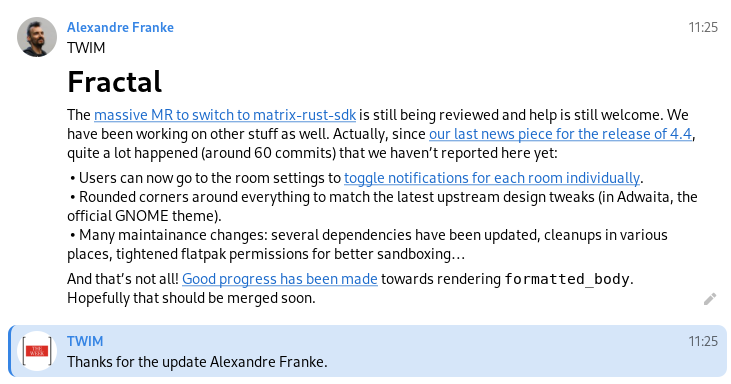
Element Web
Ryan offered:
We released Element 1.7.10 on Tuesday with some high priority fixes:
Several bugs fixed for both all widgets as well as a few specific to Jitsi call widgets
Widgets are now working again in Safari 13.1 (regressed by 1.7.9)
Quite soon after that on Wednesday, Element Web 1.7.11-rc.1 made it's way to staging:
Improved state management for voice / video calls
Revamped pinned widget UI to support resizing and more flexibility
Fluffychat
sorunome told us:
Fluffychat 0.20.0 is out! It should be available in fdroid, google play and on iOS soon!
Features
Added translations: Arabic
Add ability to enable / disable emotes globally
Add ability to manage emote packs with different state keys
Add swipe to reply - Thanks @inexcode
Initial support for compiling to desktop
Initial snap metadata - Thanks @RAOF_47
Add latex parsing as per MSC2191 -
$tex$for inline and$$for blocksChanges
Re-scale images in a separate isolate to prevent the UI from freezing
URLs without https:// now linkify
Parse all URIs, not just URLs
emails will linkify now
Make sure login to dendrite is working properly
Fixes
Fix amoled / theme settings not always saving properly
Show device name in account information correctly
Fix tapping on aliases / room pills not always working
Link clicking in web not always working
Return message input field to previous state after editing message - Thanks @inexcode

MTRNord added:
perfect for university start. Finally I can write the thesis in the University matrix ;P
Element Android
benoit offered:
Element Android v1.0.9 is now available on the PlayStore. For the next release (1.0.10), we will optimize the performance (again!). We already have made some progress when sending a message to a room. We are now working on the crypto module and also we will probably upgrade the Realm database library, which seems more stable now. Besides that, we are still implementing the remaining features with the objective of getting a good feature parity with the other Element Matrix clients.
Element-iOS
Manu reported:
This week, we have been working to upgrade libs and tools to be compatible with Xcode 12.
We are making good progress to revive a kind of background sync so that a message appears quicker in the timeline when you tap on its notification. Authentication for widgets is still in progress.
Nheko
Nheko is a desktop client using Qt, Boost.Asio and C++17. It supports E2EE (with the notable exception being device verification for now) and intends to be full featured and nice to look at
Nico (@deepbluev7:neko.dev) said:
Nheko now shows the filename of an image on hover. (Contributed by kamath_manu)
Nheko now shows the fontname in the font selection rendered using that font. This makes it easier to know, how the font will look, once you select it. (Contributed by lorendb)
Fixed a crash when closing Nheko. While this didn't really cause issues, since you were closing it anyway, it's just bad form to crash instead of exit properly.
Removed the membercache. Nheko used to load all members on startup and store them in memory. This made startup slower. Removing it sped up the start by a nice chunk and freed about 30MB of RAM on my system. One step closer to using reasonable amounts of RAM!
Fixed excessive clipping when rendering the timeline. This prevented all batching of text messages. Now it only clips the replied to message, which makes scrolling much smoother again!
Finally, some controversial change, which is currently in master but may be reverted at some point: Nheko now automatically forwards keys to verified devices, when they request the keys, without prompting you. While that can be toggled off in the settings, it currently defaults to on. This weakens backward secrecy of e2ee a bit, but it makes it possible to recover from e2ee issues much more easily. Currently I'd argue, that it is an acceptable tradeoff. It is very hard to verify room membership of users at any point in time but the current one and room membership is not verified end to end in any way, so you need to trust the server to provide you with the correct memberlist or you just send keys to verified users. While Nheko still sends keys to all members of a room, when creating the session, it only forwards your own keys to trusted users without prompting you. Currently I think this is an acceptable tradeoff, as opening a popup with "user x wants to have session y shared in room z" is unlikely to be understood by anyone properly either. I'd be glad to hear your opinions though!
That's it for this week, but next week will be interesting too. Lorendb has been hacking on profile support, allowing you to run multiple login sessions of Nheko in separate windows and some other UI features.
Dept of SDKs and Frameworks 🧰
Ruma
iinuwa reported:
In the past couple of weeks we implemented the last endpoint for the Federation
API. We are working on smoothing out some rough edges in the
ruma-federation-apicrate, like a few that @Timo addressed this past week, so it will be a little whilebefore it's completely finished.
We've also created a milestone to track implementation of Identity Service API,
the last Matrix API we have to complete.
Finally, we've created a new Matrix room focused on Ruma development,
#ruma-dev:matrix.org, focusing the original room #ruma:matrix.org on Ruma usage.
quotient
kitsune told us:
Quotient 0.6.2 has been released, with a couple of minor bugfixes. This release is used as a foundation of Quaternion 0.0.9.5 beta that's also getting out today - with support of (proper Matrix subset of) HTML, rich text user links (like pills, only lighter), initial Markdown support (if you build with fresh enough Qt), reactions (thanks to Karel Kosek @krkk), navigation to earlier events (thanks to Roland Pallai @rpallai) and quite a few other improvements. To make this release Quaternion had to gain its own basic HTML parser and Matrix-to-Qt-to-Matrix converter, which is likely to end up being a separate micro-library, in the hope that it will be useful for other Matrix projects building on Qt (even non-Quotient ones). A separate call to translators - quite a few strings got updated, so please head to Quaternion project at Lokalise and push the numbers at least to 80%!
Dept of Events and Talks 🗣️
Three talks this week!
Matrix talk at Open Source Summit EU (virtual)
Oleg announced:
If you are visiting the OSS EU next week - come to the Matrix talk. 😉
Or join us at #welcome:osseu2020.fiksel.info !
dette er på utenlandsk
dandellion reported:
In august I held an introduction to and demo of matrix talk during a conference hosted by my local makerspace.
This week the talk was uploaded! (Norwegian) https://www.youtube.com/watch?v=s9Xd0Wg_XqA
AstriCon Plan (9) on building Omnichannel contact centers with Matrix (and other tech)
Matthew said:
Jose Franco gave a great talk at AstriCon Plan (9) on building Omnichannel contact centers with Matrix, Asterisk, Kamailio and friends. You can see the video at https://youtu.be/7S6GZz8f91o?t=18558 and the talk details at https://astricon2020.sched.com/event/e0GA/blending-open-source-rtc-tools-to-build-an-omnichannel-contact-center
Dept of Interesting Projects 🛰️
Noteworthy (matrix powered distributed overlay networks via WireGuard)
balaa told us:
hey TWIM peeps! we’ve updated the README for our project Noteworthy (matrix powered distributed overlay networks via WireGuard) https://github.com/decentralabs/noteworthy - join us over in #noteworthy:tincan.community with questions / comments!
Dept of Ping 🏓
Here we reveal, rank, and applaud the homeservers with the lowest ping, as measured by pingbot, a maubot that you can host on your own server. Join #ping:maunium.net to experience the fun live, and to find out how to add YOUR server to the game.
| Rank | Hostname | Median MS |
|---|---|---|
| 1 | maescool.be | 528 |
| 2 | chatcloud.net | 533.5 |
| 3 | matrix.thedisco.zone | 654.5 |
| 4 | pc.koesters.xyz:59003 | 779 |
| 5 | shortestpath.dev | 817.5 |
| 6 | helderferreira.io | 851.5 |
| 7 | aragon.sh | 898 |
| 8 | pleasecuminside.me | 1176 |
| 9 | dodsorf.as | 1253 |
| 10 | envs.net | 1304.5 |
That's all I know 🏁
See you next week, and be sure to stop by #twim:matrix.org with your updates!
Dendrite 0.2.0 released
Hi all,
It's been over a week since our next-generation homeserver Dendrite entered beta, and it's been a wild rollercoaster ride as the team has been frantically zapping all the initial teething issues that came up - mostly around room federation getting 'stuck' due to needing to fix bugs in how room state is managed. Huge huge thanks to everyone who has spun up a Dendrite to experiment and report bugs!
We're now in an impressively better place, and it's feeling way more stable now (but please don't trust it with your data yet). So we've skipped 0.1.x and jumped straight to 0.2.0.
Now would be a great time for more intrepid explorers to try spinning up a server from https://github.com/matrix-org/dendrite and see how it feels - the more feedback the better. And if you got scared off by weird bugs in 0.1.0, now's the right time to try it again!
Full changelog follows:
Dendrite 0.2.0 (2020-10-20)
Important
- This release makes breaking changes for polylith deployments, since they now use the multi-personality binary rather than separate binary files
- Users of polylith deployments should revise their setups to use the new binary - see the Features section below
- This release also makes breaking changes for Docker deployments, as are now publishing images to Docker Hub in separate repositories for monolith and polylith
- New repositories are as follows: matrixdotorg/dendrite-monolith and matrixdotorg/dendrite-polylith
- The new
latesttag will be updated with the latest release, and new versioned tags, e.g.v0.2.0, will preserve specific release versions - Sample Compose configs have been updated - if you are running a Docker deployment, please review the changes
- Images for the client API proxy and federation API proxy are no longer provided as they are unsupported - please use nginx (or another reverse proxy) instead
Features
- Dendrite polylith deployments now use a special multi-personality binary, rather than separate binaries
- This is cleaner, builds faster and simplifies deployment
- The first command line argument states the component to run, e.g.
./dendrite-polylith-multi roomserver
- Database migrations are now run at startup
- Invalid UTF-8 in requests is now rejected (contributed by Pestdoktor)
- Fully read markers are now implemented in the client API (contributed by Lesterpig)
- Missing auth events are now retrieved from other servers in the room, rather than just the event origin
m.room.createevents are now validated properly when processing a/send_joinresponse- The roomserver now implements
KindOldfor handling historic events without them becoming forward extremity candidates, i.e. for backfilled or missing events
Fixes
- State resolution v2 performance has been improved dramatically when dealing with large state sets
- The roomserver no longer processes outlier events if they are already known
- A SQLite locking issue in the previous events updater has been fixed
- The client API
/stateendpoint now correctly returns state after the leave event, if the user has left the room - The client API
/createRoomendpoint now sends cumulative state to the roomserver for the initial room events - The federation API
/sendendpoint now correctly requests the entire room state from the roomserver when needed - Some internal HTTP API paths have been fixed in the user API (contributed by S7evinK)
- A race condition in the rate limiting code resulting in concurrent map writes has been fixed
- Each component now correctly starts a consumer/producer connection in monolith mode (when using Kafka)
- State resolution is no longer run for single trusted state snapshots that have been verified before
- A crash when rolling back the transaction in the latest events updater has been fixed
- Typing events are now ignored when the sender domain does not match the origin server
- Duplicate redaction entries no longer result in database errors
- Recursion has been removed from the code path for retrieving missing events
QueryMissingAuthPrevEventsnow returns events that have no associated state as if they are missing- Signing key fetchers no longer ignore keys for the local domain, if retrieving a key that is not known in the local config
- Federation timeouts have been adjusted so we don't give up on remote requests so quickly
create-accountno longer relies on the device database (contributed by ThatNerdyPikachu)
Known issues
- Old events can incorrectly appear in
/syncas if they are new when retrieving missing events from federated servers, causing them to appear at the bottom of the timeline in clients - Memory can explode when catching up after a federation outage.



